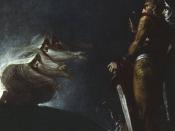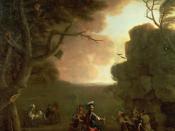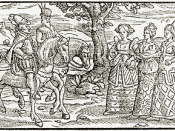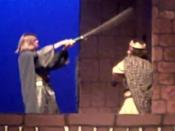MACBETH ESSAY Macbeth was a play well written by William Shakespear. Macbeth was introduced in the "first act scene three"ÃÂ. He was a general in the Scotland army and was considered to be the bravest solider of them all. Because he was so brave he was given the title Thane of Cawdor. Ever since he was given this title he went on a hunt for power. He wanted to be king. Macbeth meets three witches and they said to him.
"All hail Macbeth! Hail to thee, Thane of Glamis."ÃÂ "All hail Macbeth! Hail to thee, Thane of Cawdor."ÃÂ "All hail Macbeth! That shalt be king here after."ÃÂ (Act 1 sc3 // 50-52) Once Macbeth heard this news and found out he was Thane of Cawdor. The first thought that went through his head was to kill King Duncan for his throne. When Macbeth gets back to Cumber land he writes a letter to Lady -Macbeth.
They meet me in the day of success; and I have learned by the perfectest report, they have more in them than mortal knowledge. When I burned in desire to question them further, they made themselves air, into which they vanished. Whiles I stood rapt in the wonder of it, Came missives from the king who all- hailed me, "Thane of Cawdor"ÃÂ; by which title, before, these weird sisters saluted me, and referred me to the coming on of time, with Hail king that shalt be! This I have thought good to deliver thee, my dearest partner of greatness; that thou mightest not lose the dues of rejoicing, by being ignorant of what greatness is promised thee. Lay it to thy heart, and farewell.
(Act 1 sc5 // 1-13) Macbeth writing to his wife made it seem like he was a good man because he did a very nice thing. After Lady-Macbeth read the letter a messenger came to her door and told her that Duncan was coming to their house. That news surprised Lady-Macbeth and the way she reacted gave us our first impression of her and it was not a very good one. "Is not thy master with him? Who weren't so would have Inform'd for preperation."ÃÂ (Act 1 sc5 // 33-34) One of the biggest things that made Macbeth look greedy, mean and selfish was the killing of Duncan.
Is this a dagger I see before me, The handle toward my hand? Come let me clutch thee.
I have thee not, and yet I see thee still.
Art thou not, fatal vision, sensible To feel as to sight? Or art thou but A dagger of the mind, a false creation, Proceeding from the heat-oppressed brain? I see thee yet, inform as palpable As this which now I draw.
(Act 2 sc1 // 40-48) As time went on Macbeth became king and he had decided to throw his first banquet. That day Banquo was to go ridding with his son Fleance; however Macbeth gets two murderers to kill Banquo and Fleance. Macbeth convinces the murderers that they shouldn't feel bad because Banquo is their enemy and he should die along with his son Fleance.
Well the, now Have you consider'd of my speeches? Know That it was he in the times past which held you So under fortune, which you thought had been Our innocent self: This I made good to you In our last conference; pass'd in probation with you How you were borne in hand, how cross'd, the instruments who wrought with them; and all things else that might To half a soul and to a notion crazed Say "thus did Banquo"ÃÂ.
(Act 3 sc1 //80-90) This action done by Macbeth was because he was greedy and did not want anyone to figure out what he did. So the only way Macbeth thought he could solve things were by killing people. When he went through with his banquet and he sees Banquo there but not in human but in spirit it scares Macbeth. Some may argue that by scaring Macbeth and embarrassing him in front of all of his guests is a form of payback or revenge.
Macbeth was very frustrated about all that had been happening lately and so he decided to go and visit the three witches. When Macbeth arrived he was very rude and demanding, he wanted to get his answers and leave. "How now you secret, black and midnight hags! What is't you do?"ÃÂ (Act 4 sc2 // 47-48) The witches decided that they would answer Macbeths questions. All of Macbeths questions were answered. The witches told Macbeth that he shall fear no man born of a woman and that he shall be fearless until Burnam wood comes to Dunsinane. They also told him that Banquo's son Fleance was to be crowned king. Macbeth didn't really think much about Fleance being king; however Macbeth did like the sounds of do not be afraid until Burnam wood comes to Dunsinane. He also liked that he should not fear any man born of a woman. That night Macbeth was very high spirited.
Time, thou anticipates my dread exploits The flighty purpose never is o'ertook Unless the deed go with it: from this moment, The very first thing of my heart shall be The first thing of my hand. And even now, To crown my thoughts with acts, be it Thought and done; The castle of Macduff I will surprise; Seize upon fife; give to the edge o' the sword His wife his babes, and all unfortunate souls That trace him in his line. No boasting like a fool; This deed I will do before this purpose cool: But no more sights! Where are these gentlemen ? Come bring me where they are.
(Act 4 sc1 // 158-170) Every time Macbeth had visited the witches he had decided to kill someone. The murder Macbeth is hoping to execute is one of the evilest things he had done. Some of the blaming is put on the witches because they were the ones that built up Macbeths spirits. He follows through with his word and hires two murderers to kill Macduff's wife and son and anyone else who gets in their way.
A few days later Lady -Macbeth dies and Macbeth is told that Burnam Wood has made it's way to Dunsinane. There were 10,000 soldiers with only one objective to kill Macbeth. All of Macbeth's solders did not want to fight for him but they had to because they were forced. Macbeth first meets with young Siward and kills the young boy quickly. Macduff is the main man looking for Macbeth. Macduff is the one man Macbeth fears because he was untimely ripped from his mother's womb. Macduff kills Macbeth and ends everyone's sorrows and so no one must fear Macbeth again.
He's worth no more; They say, he parted well, and paid his score; And so god be with him! Here comes newer comfort.
(Act 5 sc9 // 21-24)





